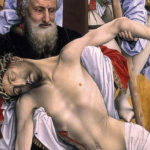April 8, 2018
Year 3, Day 98
This morning, April 8, 2012, is Easter morning. It is a day when persons who never go to church on any other day than Easter, may go to church. These generalists do not go to scoff, or to be called Christian. They go as a gesture of mystery, which may be fathomed, from a habit feeling. They come from a feeling that resurrection ought to be true, even if it is not, suggesting that there is an immortality of some sort. They may feel that, even if there were not resurrection, there ought to be something that is implied in it. They are voting for that thought as worthy of some belief as a possibility that meets an underlying longing… Read more
January 11, 2018
Year 3, Day 11
In my recent reading I have sometimes felt barraged by contradictions, paradoxes, disagreements, variant conclusions all garnered through the same evidence. In the reports of a number of experiments and field studies I am informed that the archaeological evidence is not complete enough to decide who burned Hebron, as noted in the Book of Joshua. One editor does not presuppose God at work in any of the studies. The impression is that of humanism. The preponderance of authors support the burning by the invading Israelites under Joshua in natural course. Other serious scholars in the field offer this cause, or another, and so the saga continues. A book by an eminent scholar relates the differences in those students believing the… Read more
December 14, 2017
Year 2, Day 348
Animals are important to the biblical story and the history of mankind. They are noted as the property of God. In pre-technology days they meant the difference between prehistoric and historic advancement for humanity. It would be difficult to recover the full story of our debt to animals. Before the Europeans touched the western hemisphere after Columbus, the native peoples we identify as Indians did not have draft animals like horses. Those helpful animals were introduced very early in the movement of the white race westward. The Indians took easily to the horse, as a working animal and mount for transportation. It may be difficult for modern Americans to think of Indians without the horse. Without the horse the Indian… Read more
November 13, 2017
Year 2, Day 317
I have no doubt that persons can act like Christians, that is to say perform (act) as in a reality play, and do fairly well. If Christian life is dependent upon revealed truth (and it is), the drama actors can achieve for the enduring period of the drama. What reality offers in real life context includes eternity. This last is denied the actor who is functioning for the currency of the drama. He doesn’t have to believe what the character he is depicting and is known in the script as believing, but he is the best actor who can make the character believable to the audience, even to himself. He is a part of the audience in this sense. In… Read more
November 9, 2017
Year 2, Day 313
One is impressed in reading history as related to the impact of preachers and their sermons upon the lives of individuals and society. This includes ranges of contexts, such as the difference in New England puritanism, and Virginia renaissance. From ministers much of the education of the colonial people was generated. Preachers were the common denominator in mentoring and monitoring the development of the education of their emerging youthful male members, from their congregations. Many of the leaders we extol in the various fields of development were minister-educated persons. It is said that the greatest American thinker of the eighteenth century was Jonathan Edwards. He was a preacher. It is said that the greatest American thinker of the nineteenth century… Read more
November 4, 2017
Year 2, Day 308
In addition to Biblical Proverbs, several modern and other proverbial concepts have been helpful in my life. The Wise Person Learns How to Discuss Negatives in Affirmative Ways for Understanding. The Wise Person Is Aware that Emotions Nibble Firmly at the Mind for Prominence. The Wise Person Believes That God Prefers to Solve Problems than Judge Them. The Wise Person Is Patient With the Complexity of Life Context. The Wise Person Practices the Virtues Found in the Fruit of the Holy Spirit. The Wise Person Seeks Genuine Humility Born of God’s Meaning. The Wise Person Knows That Personal Peace Is Available in Any Circumstance. The Wise Person Tries to Find That Which is Affirmative in the Ugliest Situations. The Wise… Read more
October 2, 2017
Year 2, Day 275
I am surprised that this verse gains so little attention from Christian apologists. It is an argument for peace. It has been my purpose to retain the verse for this date through the volumes of daily devotional/educational Pages looking toward a mature, practical, and satisfying Christian life and culture – especially so as to engage thought of life experience for readers. I am here engaging Christian collegians, and my family’s emerging generations, in a context I believe served me after a lifetime of study, (both secular and biblical) – travel of the world; family experience to nearly five generations; counseling for years as well as being counseled; and, engaging persons (some eminent), who I believe were both poorly and well-conditioned… Read more
June 18, 2017
Year 2, Day 169
Today I have been mulling again over the views of Stephen Hawking, the physically limited scholar dealing with the great questions of space and stuff. Hawking’s health is in serious decline. The prognosis was made long ago, but he survives. He attracted attention, not only from his creativity in studies, but because of his creativity in facing his personal ordeal. He began his career acknowledging that the start-up of creation came from God, but he gradually moved to doubt, to deism, and, at this writing appears to deny any divine intelligence. He now takes some umbrage at Isaac Newton’s claim that an intelligent and powerful being formed the universe. The key to Hawking’s final statement came, as he writes: …. Read more
May 21, 2017
Year 2, Day 141
In 2010 a study was published related to the financial and societal costs of our bad habits. Some analysts call them the sin factors of daily life costing trillions of dollars. Sin designation is seen as important to shock the society that bad habits are negative, and should be corrected as a human concern. This may be somewhat helpful, but is a gentle perception of sin. Sin in this context means bad, but is not necessarily related to actual or alleged immorality before God. There is an underlying impression that though the practices are bad they do not have lasting spiritual meaning. Perhaps the majority of persons in the world believe that we gain whatever mortality and immortality benefits there… Read more
May 15, 2017
Year 2, Day 135
We remember that the only natural factor the population can count on during human experience is change. It is presumed that those most amenable to change are most able to manage life in the natural environment. The concept of change is clearly depicted in nature. We learn early in school that there were glaciers, fires, eruptions, floods, and other forces that introduced change to communities and the world. The flood of Noah’s time might make an interesting discussion on the topic, if we knew all the details of the event. Even Noah had some difficulty with the transitional changes. At this writing much of the news and conversation is occupied with the concerns of global climate change, especially as related… Read more







